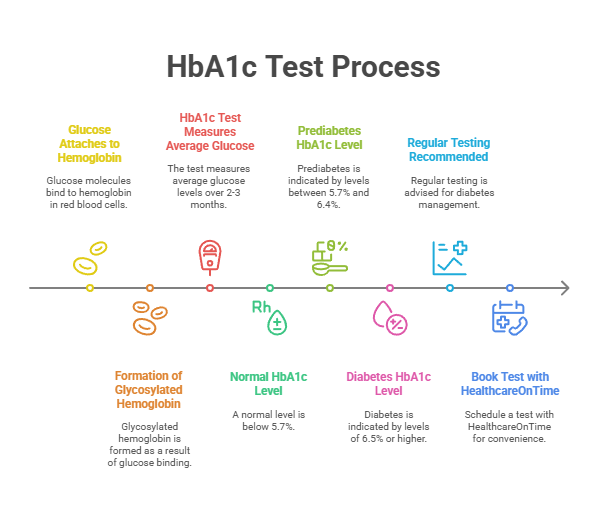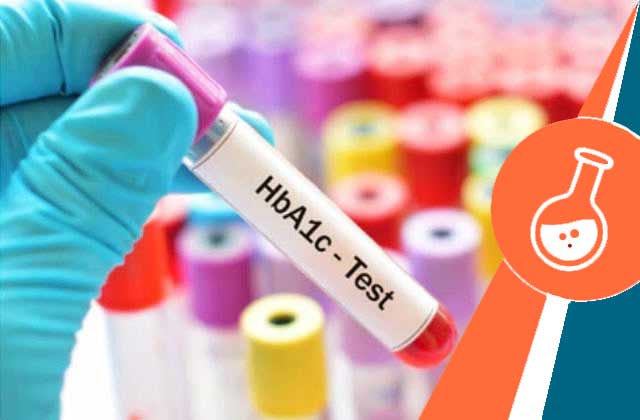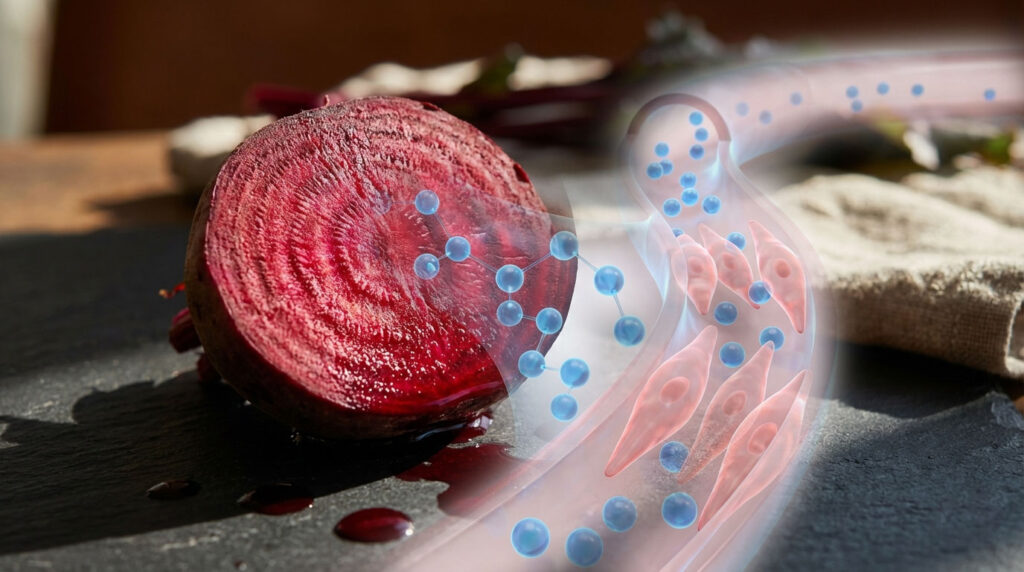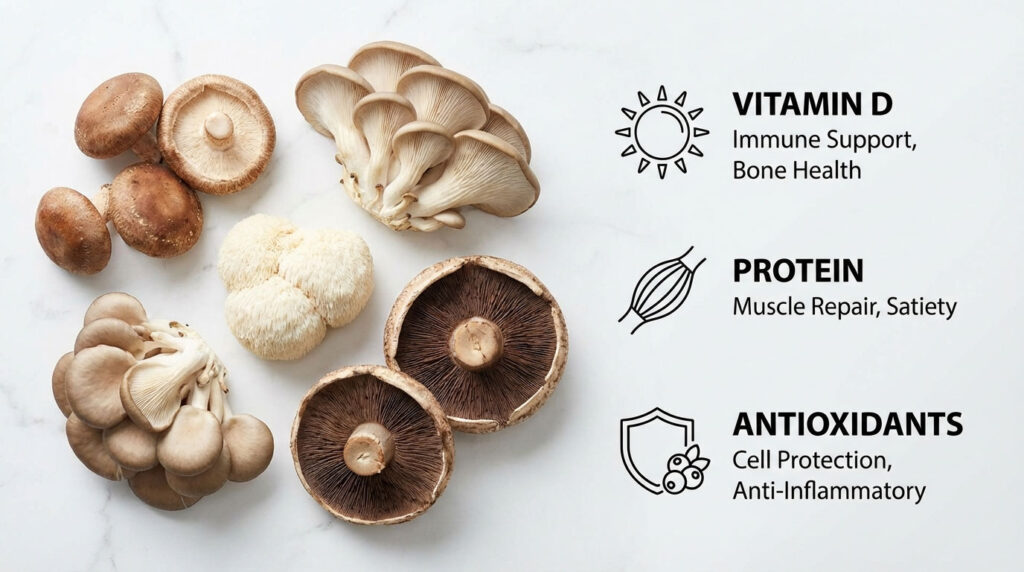
What is Hemoglobin A1c (HbA1c) Test for Diabetes?
HbA1c Test, or Glycosylated Hemoglobin Test is used to assess an individual’s blood glucose control over a past 2-3 months 1. The test measures the glycosylated hemoglobin level, which forms when glucose attaches to hemoglobin in red blood cells.
3 months sugar test is used to diagnose and monitor prediabetes and type 2 diabetes. The hemoglobin A1c test can identify if a person has prediabetes (A1C 5.7-6.4%) or diabetes (A1C over 6.5%).
Hence, HbA1c testing is integral to diabetes management, providing a valuable overview of blood sugar control over an extended period. Regular monitoring and interpretation of HbA1c levels enable healthcare professionals to assess treatment efficacy, adjust therapies, and support individuals in achieving and maintaining optimal glycemic control.
About HbA1c Test
Learn everything about the HbA1C Test, before you book lab test online. Understand the why, how, and what of this test.
What Does HbA1c Test Measure?
Haemoglobin is a protein in red blood cells that carries oxygen. When glucose in the blood attaches to it, the haemoglobin becomes glycated.
Although everybody’s haemoglobin has some sugar linked to it, the ones with higher blood glucose levels have a greater amount of glycated hemoglobin present in their red blood cells.
Haemoglobin A1c test measures the percentage of your red blood cells with sugar-coated (or glycated) haemoglobin2
What Happens When HbA1C Levels are Low?
Low HbA1C levels can have various implications, especially for individuals with diabetes. Let’s explore the consequences of low HbA1C:
- Low HbA1C is often associated with tight glucose control.
- However, overly aggressive management can lead to hypoglycemia (low blood sugar) 3.
- Symptoms of hypoglycemia include confusion, unusual behaviour, loss of coordination, slurred speech, blurry vision, and nightmares
- Low HbA1c levels can cause 4:
– Increased risk of dementia, especially in older adults
– Mental health issues
– Dizziness and weakness
– Seizure
Conducting an effective 3 months sugar test by healthcare professionals is crucial for avoiding hypoglycemia and ensuring optimal management of diabetes.
What Happens When HbA1C Levels Are High?
High HbA1C levels can have significant implications, especially for individuals with diabetes. Let’s explore the consequences of elevated HbA1C:
- A high hemoglobin A1c (HbA1C) indicates poor blood sugar control over the past few months.
- Complications associated with high HbA1C include 5:
- Cardiovascular Disease: Increased risk of heart attacks and strokes.
- Kidney Failure: Elevated HbA1C can damage the kidneys over time.
- Vision Complications: Glaucoma, cataracts, retinopathy, and macular edema.
- Nerve Damage (Diabetic Neuropathy): Commonly affects hands, feet, arms, and legs.
- Gum Disease: Elevated blood glucose levels lead to increased sugar in saliva, exposing the mouth, teeth, and gums to higher levels of sugar, germs, and plaque. This heightened exposure can irritate the gums, potentially leading to gum disease.
The Glycosylated Hemoglobin Test emphasises the need for immediate intervention, including a combination of treatment plans, medications, and lifestyle changes to achieve improved blood sugar management and reduce the risk of long-term complications. Regular monitoring of HbA1C Levels is crucial to optimise diabetes care and prevent related health problems.
Why do Doctors Recommend HbA1c Tests?
Doctors recommend the HbA1c test or Glycosylated Hemoglobin Test for diabetes management because it provides insights into long-term blood sugar control, assesses your risk of developing diabetes, and helps maintain glycated hemoglobin within the normal range. By diagnosing glycated haemoglobin levels, healthcare providers can make informed decisions about treatment plans, drug adjustments, and lifestyle changes. It is mainly recommended for individuals over 45 and those with risk factors for diabetes. You may also need an A1C test if you have symptoms of diabetes, such as:6
- Feeling very thirsty
- Urinating (peeing) a lot
- Losing weight without trying
- Feeling very hungry
- Blurred vision
- Numb or tingling hands or feet
- Fatigue
- Dry skin
- Sores that heal slowly
- Having more infections than usual
To avoid complications and live a low-risk life, one must keep glycated hemoglobin in the normal range.
How To Prepare For HbA1C Test?
The steps below help you ensure that your glycated hemoglobin test (HbA1C) provides the most accurate information about your health.
- Medication guidelines: Tell your healthcare provider about all the drugs, supplements or herbal remedies you are taking, as some substances may affect test results. Follow any specific instructions regarding drug adjustment before testing.
- Contact to doctor: Share your entire medical history with existing health conditions or symptoms to help explain test results.
What Happens During HbA1CTesting?
A Glycosylated Hemoglobin Test (HbA1C) only takes a few minutes.
- As per the scheduled time of the blood test, a Lab Technician who usually takes blood samples will arrive.
- A thin needle will be used to draw blood from your arm’s vein.
- The needle might cause a mild pinch and some discomfort.
- The lab technician then fills a collection tube with blood and then removes the needle from the skin.
- They place a small bandage on the arm
- This sample is then sent to a laboratory for analysis to determine the percentage of hemoglobin that has glycated (attached to sugar molecules).
Please note: There might be slight pain or bruising at the spot of insertion, but most of the symptoms go away quickly.
How Often Is the Test Required?
The frequency of HbA1c tests depends on various factors, including the type of diabetes, treatment plan, and individual health.
You should get glycated hemoglobin test annually as a standard measure. However, if your HbA1c levels are elevated or require closer monitoring, it may be conducted every three to six months. It’s crucial not to overlook these tests, so if it’s been over a year since your last one, reach out to your healthcare team 7.
If you take insulin or struggle to maintain blood sugar within the target range, aim for four HbA1c tests per year, which corresponds to the 3 months average sugar test.
Remember, regular 3 months sugar testing and monitoring is essential for effective diabetes management. Discuss with your healthcare provider to establish the right testing schedule for you.
Finding HbA1C Test
Should you book blood test online to check your HbA1C levels or go to the nearest clinic and get it done by a medical professional? Let’s Find Out
Can I Take the HbA1C Test At Home?
Yes, the HbA1C blood test can be taken at home. HealthcareOnTime’s at-home lab testing service in association with Thyrocare, provides a convenient and efficient way to get important medical tests done from the comfort of your place, without the need for a doctor’s visit or a trip to a lab. It is always preferable to consult with a healthcare provider about any concerns regarding your test results.
How Much Does the HbA1c Test Cost?
The HbA1c Test cost varies significantly depending on many factors.
- Location: HbA1c blood Test Price may vary depending on the city or the region in which the test is conducted. For example, in Bangalore or Mumbai, it might be expensive as compared to small towns.
- Type of facilities centres: The HbA1c test price also varies between private hospitals, government hospitals, and diagnostic centres. 3 months average sugar test price is lower in government hospitals as compared to private ones.
- Healthcare centres: Diagnostic centres, laboratories and hospitals may have different HbA1c quantitative test prices. It depends upon the benefits and reputation of the healthcare centre.
- Insurance Coverage: Individuals with health insurance can cover partial or all costs depending on their policy coverage and network providers.
- Other tests: HbA1c can be part of a larger panel of tests, such as a Diabetes screening panel or Diabetes monitoring panel. The overall cost may vary depending on the number and type of tests included in the panel.
- Additional services: Additional services such as home sample collection, express test results, or additional charges for special management may be paid, which contributes to the overall HbA1c blood test cost.
In India, the HbA1c test cost typically starts from INR 350, but prices may vary based on the specific laboratory and city. But here’s the exciting part – HealthcareOnTime is committed to making healthcare accessible to all. We provide an impressive discount on HbA1C testing in India, thanks to our trusted partner, Thyrocare. This valuable service is available in over 4500+ pin codes nationwide.
| Diabetes Tests | Price (INR) |
| ₹ 80 | |
| ₹ 80 | |
| Insulin Test | ₹ 500-800 |
By choosing HealthcareOnTime testing facilities, you can get affordable package costing for your diabetes blood test. We offer two packages, a basic package that includes 69 parameters and an advanced package that covers 105 parameters. You can also avail of Thyrocare diabetes profile test, home collection facility from our website.
| Package Type | Parameters Covered | Price (INR) |
| 69 parameters | ₹ 2249 | |
| 105 parameters | ₹ 3500 |
Test Results Interpretation
You received your HBA1C blood test results but still need help determining your HbA1C normal range.
Read this section to know if your results range between the HbA1C blood test normal range.
What do HbA1c Test Results Mean?
The HbA1C test results are reported by healthcare professionals as a percentage. A higher sugar test HbA1C percentage corresponds to a higher average blood sugar level. The results of the diagnosis are normally interpreted as follows 8:
| Category | A1C Range |
| Normal | Below 5.7% |
| Prediabetes | 5.7% – 6.4% |
| Diabetes | 6.5% or higher |
If your HbA1C level is above the mentioned target, your doctor may recommend you adjust your diabetes treatment plan.
A1c and Blood Sugar
The A1c test checks your blood sugar levels over 2-3 months to help manage diabetes 9. Blood sugar gives energy to cells, controlled by insulin. High A1c levels mean you might have diabetes or prediabetes, so changes to treatment may be needed. Testing regularly helps decide on medication and lifestyle changes to keep your health on track.
What Is the HbA1C Normal Range?
The normal HbA1c level varies slightly among different sources but generally, it falls as follows:
| HbA1c Normal range | 4% – 5.6% |
What Medical Conditions Can Cause High HbA1c Levels?
High HbA1c levels, indicate poor blood sugar control and can be caused by various medical conditions, including:
- Diabetes (poorly controlled Type 1 diabetes & Type 2 diabetes)
- Prediabetes
- Obesity
- Pancreatic disorders (pancreatitis, pancreatic cancer)
- Cushing’s syndrome
- Hyperthyroidism
- Chronic kidney disease
- Chronic liver disease (cirrhosis)
- Certain medications (steroids, antipsychotics)
- Stress or illness (can temporarily increase blood sugar levels)
- Polycystic ovary syndrome (PCOS)
What Medical Conditions Can Cause Low HbA1c Levels?
Low levels of HbA1c typically indicate good blood sugar control and are commonly associated with well-managed diabetes. However, there are a few medical conditions and situations that can cause lower-than-normal HbA1c levels:
- Anaemia (iron deficiency anaemia, hemolytic anaemia)
- Blood transfusion
- Hemoglobinopathies (thalassemia, sickle cell disease)
- Chronic kidney disease
- Pregnancy
- Chronic liver disease (cirrhosis)
Is There Anything Else You Need to Know About HbA1C Test?
HbA1c test at home or in the lab is not used for diagnosing gestational diabetes or type 1 diabetes. Additionally, conditions like anaemia or other blood disorders can impact A1C accuracy for diabetes diagnosis. Similarly, kidney failure or liver disease may influence A1C results 10. In such instances, alternative diagnostic tests may be recommended by your healthcare provider.
Disclaimer: Although we have endeavoured to provide accurate information on this page, we strongly recommend that you seek advice from your doctor before relying on any of the test ranges or lab-test recommendations mentioned herein.
More Related Tests
Why To Book with HealthCareOnTime

17 Crores+ Samples Processed

World Class Technology Labs

25+ Years of Trust & Experience

Free Home Collection
FAQs Around HbA1c Test (Glycosylated Hemoglobin)
What is the best time to go for a hemoglobin A1C test?
It is advisable to schedule an HbA1c test during a period of stable blood glucose levels to obtain accurate results. The best time for the blood sample to be taken is early morning.
How often should HbA1c be tested?
It is advised by healthcare professionals to get an HbA1c Test done every 6 months.
How do you reduce the HbA1c level in a week?
While significant changes may not be achievable within a week, certain strategies can help kick-start the process toward achieving a normal HbA1c level.
- Monitor and Measure
- Dietary Modifications
- Physical Activity
- Medication Management
- Stress Management
- Regular Monitoring
Does eating before the A1C test affect the results?
No, eating before the A1C test does not affect the HbA1c Test Results.
What is normal HbA1C by age?
Age in Years | HbA1c | Mg/dL |
20-39 | 6% | 126 |
40-59 | 6.1% | 140 |
≥60 years | 6.5% | 160 |










